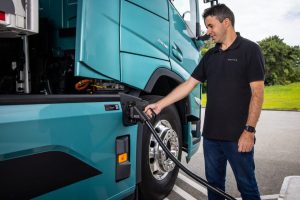- Hydrogen vs Electric Trucks: Discover how hydrogen and electric trucks compare in powering the next generation of zero-emission freight—will your route favor the quick refueling of hydrogen or the efficiency of electric?
- Efficiency or Range?: In the match-up of hydrogen vs electric trucks, see which comes out ahead in operational efficiency, quick refueling capabilities, operational range and cost-effectiveness for long hauls and regional deliveries.
- Innovations in Infrastructure: Explore the latest developments shaping the necessary infrastructure for hydrogen and electric trucks. Are we ready for a nationwide rollout?
As the trucking industry seeks sustainable solutions, the debate between hydrogen and electric trucks intensifies. This article delves into both technologies to determine which is poised to shape the future of trucking.
In the evolving landscape of sustainable transportation, hydrogen and electric trucks are pivotal contenders. This detailed analysis compares these technologies on key metrics like efficiency, range, and infrastructure needs to gauge their potential in modern trucking.

As governments ramp up incentives for zero-emission vehicles, the stakes are high for both hydrogen and electric truck technologies.
Comparing Hydrogen and Electric Trucks: Efficiency and Range
Battery-electric trucks (BETs) and hydrogen fuel cell electric trucks (FCETs) are at the forefront of zero-emission transportation. BETs boast high energy efficiency, converting over 90% of electrical energy from the grid to power at the wheels. In contrast, FCETs have an overall efficiency of about 30–40% due to energy losses during hydrogen production, compression, and conversion in fuel cells.
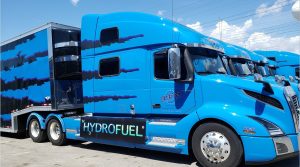
Hydrogen trucks offer a glimpse into long-haul sustainability, combining fast refueling with extensive range to meet the demands of modern logistics.
When it comes to range, hydrogen trucks can travel up to 500 miles on a single tank, comparable to diesel trucks. Battery-electric trucks currently offer ranges between 100 and 300 miles, with advancements expected to increase these figures. However, the weight and size of batteries needed for extended range can reduce payload capacity.
Enjoying our insights?
Subscribe to our newsletter to keep up with the latest industry trends and developments.
Stay InformedInfrastructure Needs for Hydrogen and Electric Trucks
“The infrastructure required for hydrogen and electric trucks is a significant factor in their adoption. Hydrogen fueling stations are scarce and require substantial investment in production facilities, storage, and dispensing equipment.”
Building a comprehensive network involves challenges like transportation and storage of high-pressure hydrogen.
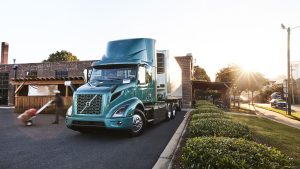
Electric trucks excel in urban settings, where shorter routes and overnight charging align perfectly with their operational capabilities.
Electric charging infrastructure is more developed, especially for passenger vehicles. However, scaling up for heavy-duty trucks demands high-capacity charging stations and upgrades to the electrical grid. Megawatt charging systems are being developed to reduce charging times for large battery packs but require significant grid enhancements.
Refueling Times: Hydrogen vs Electric Trucks
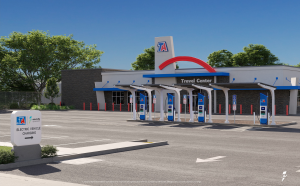
The future of trucking hinges on the scalability of infrastructure: hydrogen’s fueling stations versus electric’s charging networks.
Refueling time impacts trucking efficiency. Hydrogen fuel cell trucks can refuel in about 10–20 minutes, similar to diesel trucks. Battery-electric trucks require longer charging times, ranging from one to several hours, depending on the charger and battery capacity. Fast-charging technologies are improving but still lag behind hydrogen in terms of speed.
Viability for Different Trucking Applications
- Long-Haul Transportation: Hydrogen trucks are advantageous due to longer range and quicker refueling, making them suitable for long-distance routes.
- Regional and Urban Delivery: Battery-electric trucks excel in shorter routes with opportunities for overnight charging, benefiting from lower operating costs and existing infrastructure.
Electric trucks represent the future of urban deliveries, merging sustainability with cutting-edge technology for cleaner cities.
- Specialized Operations: In environments like ports and mines, BETs offer zero emissions and reduced noise, enhancing operational efficiency.
What Are the Operating Costs of Hydrogen vs Electric Trucks?
Operating costs encompass energy expenses and maintenance. BETs typically have lower energy costs per mile due to higher efficiency and lower electricity prices. Maintenance costs are also reduced because of fewer moving parts. Hydrogen trucks face higher fuel costs due to the production and distribution of hydrogen and may have increased maintenance expenses related to fuel cell systems.
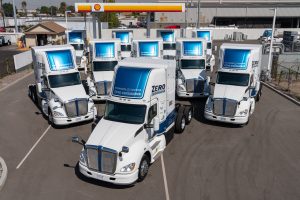
Green hydrogen could revolutionize fuel cells, but its impact depends on overcoming the current reliance on natural gas.
Environmental Impact: Hydrogen vs Electric Trucks
- Battery-Electric Trucks: Offer significant emissions reductions when charged with renewable energy. The environmental impact of battery production and disposal, including mining for raw materials, is a consideration.
- Hydrogen Fuel Cell Trucks: Environmental benefits depend on hydrogen production methods. Green hydrogen produced via renewable energy offers substantial emission reductions, but most hydrogen is currently derived from natural gas, which emits CO₂.
Which Technology Is More Scalable?
- Battery-Electric Technology: Benefits from economies of scale due to the growth of electric passenger vehicles, leading to cost reductions and technological advancements.
With battery technology advancing, electric trucks could soon match the range currently dominated by hydrogen.
- Hydrogen Technology: Requires significant investment in infrastructure and technology to become scalable. Current costs for fuel cells and hydrogen production are high.
Future Outlook: Hydrogen vs Electric Trucks
The future may see a combination of both technologies. Advances in battery technology could extend the range and reduce charging times for BETs. Innovations in hydrogen production and fuel cell efficiency could make FCETs more competitive. Policy decisions, infrastructure investments, and technological breakthroughs will influence the dominant technology in trucking.
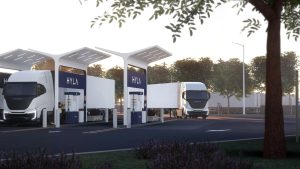
Investments in infrastructure will decide which technology—hydrogen or electric—accelerates ahead in the zero-emission race.
In the debate of hydrogen vs electric trucks, there is no one-size-fits-all answer. Each technology has strengths and challenges. Battery-electric trucks are currently more suitable for short to medium-haul routes with established charging infrastructure, while hydrogen fuel cell trucks hold promise for long-haul applications due to their range and quick refueling. The trucking industry’s future will likely be shaped by ongoing developments in both technologies, aiming for zero-emission transportation that is efficient and economically viable.
Future-Ready Trucking: Key Developments in Hydrogen and Electric Technologies
- Policy Shifts: Governments worldwide are increasing incentives for zero-emission vehicles, potentially tipping the scales between hydrogen and electric technologies.
- Technological Breakthroughs: Recent advancements in battery and hydrogen fuel cell technologies are enhancing efficiency and reducing costs, making both options more viable.
- Infrastructure Expansion: Significant investments are being made to expand hydrogen fueling stations and electric charging networks, but which is growing faster?
- Corporate Adoption: Leading logistics companies are starting pilot programs to test the viability of hydrogen and electric trucks across different terrains and operations.
- Environmental Impact Studies: New studies highlight the long-term environmental benefits and challenges of both technologies, influencing future industry standards and practices.
The future of trucking hinges on the scalability of infrastructure: hydrogen’s fueling stations versus electric’s charging networks.
Explore Further Insights on Hydrogen and Electric Trucks
- TA Truck Charging Stations: Learn about the expansion of TA truck charging stations and the establishment of one of the first public-access medium and heavy-duty EV charging sites in the U.S. Read more…
- Volvo Electric Trucks Funding Soars: Discover how Volvo Electric Trucks’ funding boost aims for 100% fossil-free operations by 2040 with a $208 million grant. Read more…
- Daimler Logistics Electrification: Explore how Daimler Logistics’ Electrification initiative with Salem and Electrada is revolutionizing sustainable transportation. Read more…
- Analyzing EV Mandates in Trucking: Uncover the complexities of EV mandates in trucking through a detailed analysis, including industry critiques and the evolving challenges faced by trucking firms. Read more…
- Nikola Hydrogen Station in Ontario: Explore the latest development as Nikola unveils a new hydrogen station, advancing the infrastructure for hydrogen trucks. Read more…
- Peterbilt’s Hydrogen Engine Innovation: Discover how Peterbilt is leading the charge in hydrogen engine technology, paving the way for cleaner and more efficient trucking solutions. Read more…
- Hyzon’s Liquid Hydrogen Truck Triumph in Texas: Learn about Hyzon Motors’ breakthrough with their liquid hydrogen-powered trucks, showcasing significant advancements in hydrogen fuel technology. Read more…
- Bosch’s 2023 Hydrogen Truck: Get insights into Bosch’s latest hydrogen truck model and its potential to transform the transportation industry with zero emissions. Read more…
- Volvo and Westport’s Zero Emissions by 2040: Understand Volvo and Westport’s ambitious plans for achieving zero emissions by 2040, focusing on hydrogen as a key part of their strategy. Read more…
Explore External Insights on Hydrogen & Electric Truck Technologies
- MIT’s Advancements in Hydrogen Technology: Gain insight into how MIT’s research is revolutionizing hydrogen use in long-haul trucking, focusing on sustainability and efficiency. Read about MIT’s groundbreaking hydrogen technology.
- Union of Concerned Scientists on Hydrogen Trucks: Understand the emissions impact and benefits of hydrogen-powered heavy-duty trucks from the Union of Concerned Scientists. Learn about the implications of hydrogen trucks.
- U.S. Department of Energy Hydrogen Hubs Initiative: Read about the U.S. DOE’s ambitious $8 billion program to create clean hydrogen hubs, aiming to revolutionize energy sectors including transportation. Discover the DOE’s clean hydrogen hubs initiative.
- IAEA’s Roadmap for Hydrogen Deployment: Learn how the International Atomic Energy Agency is developing a roadmap for commercial deployment of hydrogen, enhancing the global energy framework. Explore the IAEA’s hydrogen deployment roadmap.
- Global Trends in Heavy Electric Vehicles: Explore the IEA’s analysis of the growth in electric heavy-duty vehicle markets, including trucks, which are rapidly gaining momentum in global sales. IEA – Trends in Heavy Electric Vehicles.
- NREL’s Electrification Futures Study: Explore comprehensive insights from NREL’s ongoing Electrification Futures Study, which assesses the potential impacts of widespread electrification in all U.S. economic sectors including transportation. Learn more about the future of electrification.
- NREL’s Medium and Heavy-Duty Vehicle Charging Infrastructure: Discover the challenges and strategies for developing charging infrastructure for medium and heavy-duty vehicles, essential for supporting the electrification of commercial transportation. Explore charging solutions for heavy-duty vehicles.
- MIT’s Innovations in Battery Technology: Dive into MIT’s research on battery technology, which focuses on developing advanced materials and designs to improve the performance, safety, and cost-effectiveness of batteries. Read about MIT’s cutting-edge battery research.
- Review the Practical Considerations for implementing electric vs hydrogen trucks in long-haul transport from Skillbee Blogs.



